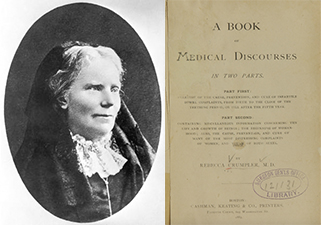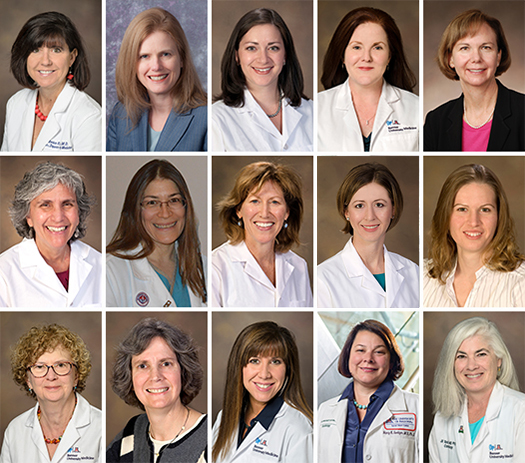 A photo of Dr. Elizabeth Blackwell next to a manuscript on "Medical Discourses" by Rebecca Lee Crumpler, MD, the first African American female physician in the United States, who graduated from Boston's New England Female Medical College in 1864.
A photo of Dr. Elizabeth Blackwell next to a manuscript on "Medical Discourses" by Rebecca Lee Crumpler, MD, the first African American female physician in the United States, who graduated from Boston's New England Female Medical College in 1864.
While Feb. 3 was National Women Physician Day, celebrating the 195th birthday of Elizabeth Blackwell, MD, the first woman to graduate from a medical school in the United States (1849, Geneva College, New York)—today, March 8, is International Women’s Day.
In celebration, we’d like to recognize all women in medicine at the UA Department of Medicine, particularly leaders. Female physicians in leadership positions within our department include:
 Dr. Monica Kraft – Department Chair
Dr. Monica Kraft – Department Chair- Dr. Julie Bauman – Chief, Division of Hematology and Oncology
- Dr. Cristine Berry – Director, Pulmonary Function and Exercise Physiology Laboratory
- Dr. Tara Carr – Director, Allergy and Immunology Fellowship Program
- Dr. Tammy Clark Ojo – Vice Chair for Clinical Affairs and Director, Adult Cystic Fibrosis Program
- Dr. Elizabeth Connick – Chief, Division of Infectious Diseases
- Dr. Mindy Fain – Chief, Division of Geriatrics, General Internal and Palliative Medicine, and Director, Geriatric Medicine Fellowship Program
- Dr. Julia Indyk – Director, Cardiovascular Disease Fellowship Program
- Dr. Elizabeth Juneman — Director, Outpatient Cardiology Services
- Dr. Victoria Maizes – Chief, Division of Integrative Medicine
- Dr. Hillary McClafferty – Director, Integrative Medicine Fellowship Program
- Dr. Laura Meinke – Director, Internal Medicine Residency Program – Tucson Campus
- Dr. Deb Meyers – Co-Chief, Division of Genetics, Genomics and Precision Medicine
- Dr. Merri Pendergrass – Director, Adult Diabetes Program
- Dr. Linda Snyder – Director, Critical Care Medicine Fellowship Program and Hospice & Palliative Medicine Fellowship Program
- Dr. Amy Sussman – Vice Chair for Education, Clerkship Director and Director, Nephrology Fellowship Program
- Dr. Nancy Sweitzer – Chief, Division of Cardiology
- Dr. Jil Tardiff – Vice Chair for Research
In several cases, they are the first females to hold these positions.
Those are good numbers when you consider national and state statistics.
Women make up 33.7 percent of the 926,119 U.S. physicians and 32.1 percent of the 16,863 physicians in the state of Arizona (as of September 2016), according to a Henry J. Kaiser Family Foundation report.
In addition, according to the Association of American Medical Colleges report, “The State of Women in Academic Medicine: The Pipeline and Pathways to Leadership, 2013-2014”:
47% of medical students are women
46% of residents are women
38% of full-time academic medicine faculty are women
21% of full professors are women
22% of tenured professors are women
24% of division chiefs are women
15% of department chairs are women
33% of senior associate/vice deans are women
16% of deans are women.
If you find that interesting, check out this JAMA Internal Medicine editorial from the February 2017 issue by UC San Francisco’s Drs. Anna L. Parks and Rita F. Redberg, “Women in Medicine and Patient Outcomes – Equal Rights for Better Work?”
For additional information, refer to the American Medical Women’s Association website for resources on career development, networking, mentoring, global opportunities, funding and education. You can also watch this video on the past century of U.S. women in medicine from the association’s 100th anniversary of its founding in 1915 when women accounted for just 6 percent of all doctors.
Want to learn more about women who served as pioneers in medicine? Visit this Wikipedia page to read about U.S. women physicians and their contributions to medical science and health care: https://en.wikipedia.org/wiki/Women_in_medicine

